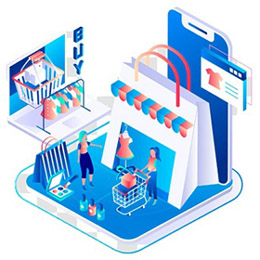In an eye-opening conversation between Peter Diamandis and James Altucher, the two inquisitive minds envision the future of big data and the profound impact it will have on the fashion industry (amongst many other facets of life). When James poses the question, “what is the next evolution in the free, data-driven business model?” Peter answers that, “we’re heading towards a time where you’re going to be able to know anything you want, at anytime you want, anywhere you want. It’s one of the biggest ideas that no one’s talking about.” And its one that will profoundly transform the fashion industry.

If for example, you want to know the average spectral color of a man’s blouse on Madison Avenue today, it will be knowable. We’re heading towards a point where we will have a massive sensor layer. There will be cameras, LiDAR and radar on autonomous vehicles, drones, low Earth orbit satellites, street corners, storefronts, augmented reality (AR) glasses, and on and on. There will literally be trillions of sensors. They will be everywhere. In the near future, according to Diamandis, information is going to be ubiquitous.
Peter Diamandis – engineer, entrepreneur, author and investor, best known for being founder and chairman of the X Prize Foundation, as well as the co-founder of Singularity University.
James Altucher – angel investor, trader, serial entrepreneur, chess master, author, and podcaster. (audio clip courtesy of The James Altucher Show)
Big Data Will Let Clothing Brands Know Fashion Trends For Specific Times, Locations And Demographics
 How will we use this immense amount of data in a business context? Well if you’re a fashion designer or clothing manufacturer and want to know what the trends are, you can stay on the cutting edge of fashion because you know exactly what people are wearing right now. You can start to ask questions like, does today’s fashion trend correlate with the weather or the temperature? You can start to find correlations that were never knowable before. In the past you’d hire experts that had an opinion. Sure they might do some surveys and so forth, but their opinions weren’t data driven. But now the data is fundamentally there. You can start to do machine learning correlations and say “oh, this is how the human brain reacts.” This is how a demographic of eighteen-year-old teenage girls react. Or, this is how 87-year-old octogenarian men react to these particular variables. So once manufacturing speeds up (thanks to other disruptive technologies like 3D printing), you’ll be able to change the entire fashion line that you’re delivering overnight. Once you’ve realized that the trend on Madison Avenue (for example) is changing, or will change due to variables such as weather, or holidays, or any other piece of measurable data, as a clothing manufacturer you’ll be able to stay on the cutting edge of fashion for that day and that particular location.
How will we use this immense amount of data in a business context? Well if you’re a fashion designer or clothing manufacturer and want to know what the trends are, you can stay on the cutting edge of fashion because you know exactly what people are wearing right now. You can start to ask questions like, does today’s fashion trend correlate with the weather or the temperature? You can start to find correlations that were never knowable before. In the past you’d hire experts that had an opinion. Sure they might do some surveys and so forth, but their opinions weren’t data driven. But now the data is fundamentally there. You can start to do machine learning correlations and say “oh, this is how the human brain reacts.” This is how a demographic of eighteen-year-old teenage girls react. Or, this is how 87-year-old octogenarian men react to these particular variables. So once manufacturing speeds up (thanks to other disruptive technologies like 3D printing), you’ll be able to change the entire fashion line that you’re delivering overnight. Once you’ve realized that the trend on Madison Avenue (for example) is changing, or will change due to variables such as weather, or holidays, or any other piece of measurable data, as a clothing manufacturer you’ll be able to stay on the cutting edge of fashion for that day and that particular location.
Fashion Customized To Individual Tastes and Desires
 Not only will clothing brands know specific fashion trends at any given time, but they will be able to customize apparel to the individual’s tastes and desires. In combination with other disruptive technologies like VR, 3D printing, and drone delivery, you’ll be able to order an outfit the day before a formal event. You’ll simply visit a VR store in which everything is your size and have an AI consultant that knows your specific preferences and the up-to-date trends. Your AI assistant will initiate a VR fashion show, where you (your perfectly matched avatar), will model different outfits on a catwalk. Once you see something that appeals to you, you can take a closer look of your virtual self in the outfit, and even see how it looks with your shoes in that are in the closet. Once your satisfied that its the right choice, it will be immediately manufactured to your exact shape and size – to the millimeter – then shipped to you via drone delivery later that day.
Not only will clothing brands know specific fashion trends at any given time, but they will be able to customize apparel to the individual’s tastes and desires. In combination with other disruptive technologies like VR, 3D printing, and drone delivery, you’ll be able to order an outfit the day before a formal event. You’ll simply visit a VR store in which everything is your size and have an AI consultant that knows your specific preferences and the up-to-date trends. Your AI assistant will initiate a VR fashion show, where you (your perfectly matched avatar), will model different outfits on a catwalk. Once you see something that appeals to you, you can take a closer look of your virtual self in the outfit, and even see how it looks with your shoes in that are in the closet. Once your satisfied that its the right choice, it will be immediately manufactured to your exact shape and size – to the millimeter – then shipped to you via drone delivery later that day.
Deep Learning Will Continue To Hone In On Your Tastes
And if you think this already sounds science fiction, big data and disruptive technologies impact on the fashion industry doesn’t stop there. You can also imagine some form of deep learning happening as well. With the trillions of sensors connected to a larger network in the cloud, computers will start to process all the data sets of everyone’s choices, in addition to the individual’s choices, to come up with better, more accurate recommendations as time goes on. So at the end of your evening at the formal event, for example, deep learning will interpret your biometrics to know if you’re satisfied or dissatisfied with your decision. And they’ll know the outcome of individuals similar to you, who made similar fashion choices. In this way, they’ll be able to help you make progressively better and better decisions going forward.

And it gets even better. Using disruptive technology like augmented reality glasses, another layer of data will be created based on your your intentionality (your mental state) as you come across different apparel. Future augmented reality glasses will have cameras that not only look ahead, but simultaneously look back at your pupils. So if the glasses notice that you linger on someone’s sweater (for example), it’ll take note of this fact. And if you’re having a conversation and comment positively on the sweater, that will also be noted. A data set will continuously evolve based on your thoughts, beliefs and desires. So when you eventually say tell your AI assistant, “I need a sweater to wear tomorrow, get it for me,” it will have a pretty good idea of what to purchase for you. Or, you may not even need to order it directly. In your weekly or monthly drone delivered fashion box, you can receive a new sweater without the need to expend mental energy thinking about what to purchase. AI will make a more informed decision that you are capable of, and you can expend that energy on more productive pursuits.
Profiting From The Emergence Of Big Data In Fashion
There are a number of ways to profit from the emergence of big data (and other disruptive technologies) in the fashion industry.
Learn More About Data Science | Better Understand The Opportunities
Below are a number of free and paid online courses related to Big Data Analysis.
- Khan Academy – Data Analysis & Big Data
- LinkedIn Learning – The fundamentals of data science
- Learning Data Science: Understanding the Basics
- Coursera – Introduction to Data Science Specialization
- Coursera – Data Science Specialization
Keep An Eye Out For Apparel Startups That Utilize AI and Big Data
Thanks to equity crowdfunding sites, investors have the opportunity to get in on the ground floor of promising Apparel Startups that will disrupt their industry using Big Data and AI. While this can be very risky (only a fraction of startups ever reach profitability), pick the right one and you can see gains that eclipse those of larger publicly traded companies. Three equity crowdfunding sites in which apparel startups may appear are as follows (you’ll need to be patient and check back from time to time).
Monitor The Leading Direct-To-Consumer Apparel Companies
While there is a long ways to go before we can determine which apparel companies will effectively use big data and AI to disrupt the fashion industry, we can observe which companies are quickest to adapt to evolving trends. The following clothing brands are early leaders in the direct-to-consumer business model for apparel. Will they continue to evolve and lead in their adoption of big data? That’s yet to be seen, but worthy of watching.





